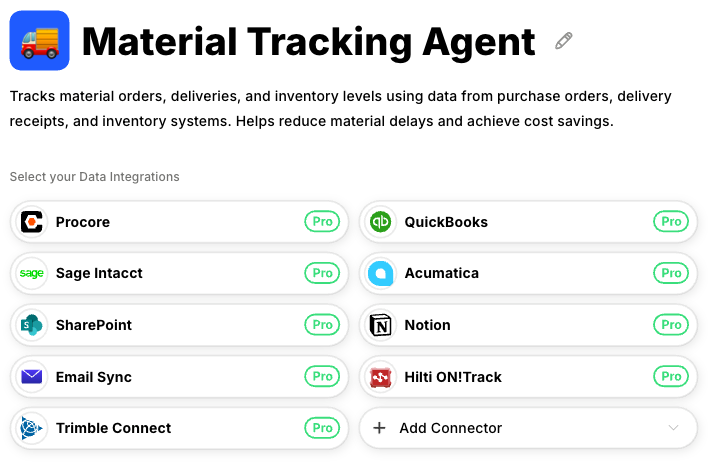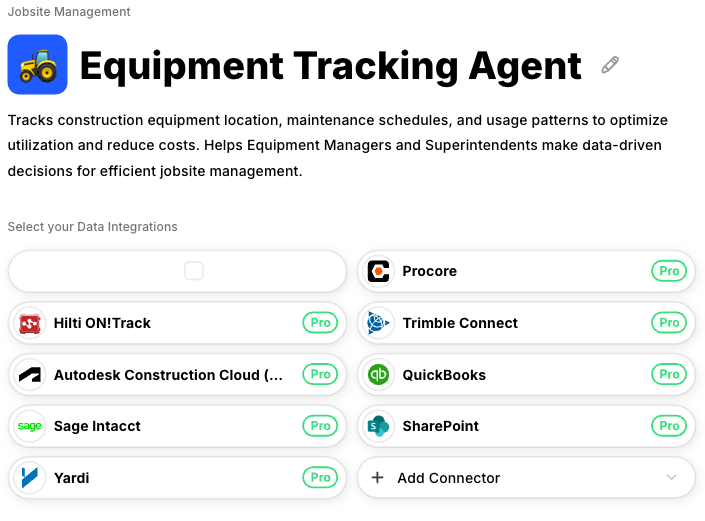This article was last updated on November 6, 2025
The concrete truck was supposed to arrive Tuesday. It's now Friday, and your project manager just called to report crews standing idle for the third day, costing your firm $12,000 in labor while the schedule slips further behind. Your client is demanding answers, but you're stuck manually checking emails, texts, and three different systems to piece together what happened.
Construction teams lose millions annually because critical material data remains trapped in disconnected systems. Project managers waste significant time each week:
- Manually transferring order information between procurement and project platforms
- Cross-checking delivery schedules against conflicting email communications
- Reconciling inventory discrepancies between site reports and accounting records
AI agents eliminate these data bottlenecks by automatically connecting your existing systems. These intelligent workers handle the continuous flow of material information across platforms, providing real-time visibility that prevents costly delays and keeps projects moving forward.
What is Construction Material Tracking Software
Construction teams waste hours daily copying purchase order data between procurement systems, spreadsheets, and project management platforms. Material tracking software eliminates this manual data entry by automatically synchronizing order information, delivery status, and inventory levels across all connected systems.
What Material Tracking Software Handles
- Order management: Compares supplier pricing and delivery history to recommend the best vendors for your timeline
- Delivery tracking: Shows exactly where your concrete truck is and alerts you to delays before crews arrive on site
- Inventory monitoring: Warns you about material shortages before installation day, not during the pour
- Automated reordering: Orders more materials when stock runs low, preventing emergency rush orders at premium prices
Teams using these systems respond to RFPs faster, avoid costly schedule delays, and stop wasting time chasing down delivery updates by phone.
From Spreadsheets to Intelligent Automation
Earlier systems meant updating inventory counts in multiple spreadsheets while delivery confirmations piled up in your email. Cloud-based tools helped, but you still spent hours moving data between platforms.
AI agents handle this automatically. They predict when you'll run out of materials based on your project schedule, reroute deliveries when traffic hits, and find backup suppliers when your primary vendor shows delays. Instead of discovering you're short on rebar during foundation work, you get alerts with solutions before crews show up.
How AI Agents Automate Material Workflows
AI agents run continuously in the background, handling the material management tasks that typically consume your day. Here's how they work across your procurement and delivery cycles.
Order Management That Learns Your Projects
AI agents analyze your historical material usage, current project schedules, and supplier performance to generate purchase recommendations. Instead of manually comparing vendor quotes and delivery timelines, you receive specific suggestions: "Order from Supplier A for Tuesday delivery at 15% below your usual cost" or "Your preferred vendor shows weather delays, Supplier B can deliver on schedule."
The system monitors material consumption rates against your project timeline. When concrete usage runs higher than planned, agents adjust reorder points automatically and flag potential shortages before they impact your pour schedule. This eliminates the manual vendor comparison process that typically eats up hours during each procurement cycle.
Dynamic reorder points adapt to changing conditions. Weather delays push your schedule back? Reorder thresholds adjust automatically. Unexpected site conditions accelerate material use? You get early warning with sourcing alternatives already identified.
Delivery Monitoring That Prevents Surprises
AI agents track every delivery from order placement to site arrival. GPS data from trucks, warehouse processing status, and supplier production timelines flow into one view accessible to your entire team. No more phone tag with dispatchers to find out where your steel delivery is.

The system predicts delays before they hit your schedule. Traffic congestion on the delivery route? You get an alert with estimated impact and alternative delivery windows. Supplier production running behind? Agents identify backup sources and present options while you still have time to adjust crew schedules. When disruptions occur, the system immediately surfaces alternative suppliers based on availability, distance, and compatibility with your project specifications.
This visibility enables just-in-time delivery strategies that minimize on-site storage costs and material handling. Deliveries synchronize with installation schedules automatically, reducing the carrying costs and site congestion that come with early deliveries.
How This Compares to Manual Processes
Coordinating Materials with Equipment
Material tracking and equipment tracking serve different needs but deliver powerful results when connected. When your concrete delivery shows a potential delay, the system automatically adjusts pumping equipment arrival to prevent idle time charges. When equipment maintenance schedules show upcoming downtime for critical placement equipment, material deliveries adjust to avoid perishable materials arriving without the means to install them.

These integrated workflows eliminate the manual coordination that typically consumes project manager time and prevents scheduling conflicts before they impact field operations.
Challenges in Material Orders, Deliveries, and Inventory Management
Managing materials efficiently is critical for project success, but traditional methods often fall short. AI agents are emerging as essential tools to address persistent challenges in material tracking, deliveries, and inventory management.
Key Challenges and AI Agent Solutions
1. Tracking Materials Across Disconnected Systems
Problem: Traditional paper-based or disconnected systems create errors in material location and quantity records. Project managers waste hours manually cross-referencing information across procurement systems, email threads, and spreadsheets, leading to costly delays when materials can't be located or quantities are incorrect.
Solution: AI agents provide real-time visibility by automatically connecting your existing systems. These intelligent workers extract data from disparate sources, maintain accurate material counts, and deliver precise location updates across platforms. This eliminates the risk of misplaced items and prevents idle crew time due to missing materials.
2. Preventing Material Shortages Before They Impact Projects
Problem: Construction teams often discover material shortages during critical installation phases, forcing emergency purchases at premium prices and causing schedule delays. Without predictive capabilities, project managers can't anticipate supply issues until it's too late to prevent impacts.
Solution: AI agents analyze historical usage data, market trends, and external factors like seasonality to predict potential shortages well in advance. This early warning system enables teams to secure materials ahead of time and adjust schedules proactively, avoiding production bottlenecks and maintaining workflow continuity.
3. Organizing Warehouse Operations for Maximum Efficiency
Problem: Disorganized warehouse and laydown areas lead to incorrect inventory counts and delayed order fulfillment. Materials get buried, misplaced, or forgotten, causing retrieval delays that cascade into installation slowdowns and schedule impacts.
Solution: AI agents optimize storage layouts based on material turnover data, usage patterns, and project timelines. The system continuously improves retrieval processes and automatically triggers reordering when stock reaches project-specific thresholds, reducing manual errors while improving field team productivity.
4. Ensuring Data Accuracy Across Multiple Systems
Problem: Manual documentation processes introduce human error, leading to miscounts, lost items, and poor decision-making. When data lives in multiple systems, discrepancies multiply, and no single source of truth exists for material status and availability.
Solution: AI agents verify data accuracy using image recognition and RFID technology, automatically updating records as materials move through the supply chain. This continuous verification process minimizes costly discrepancies between systems and provides real-time material status to everyone who needs it.
5. Reducing Material Loss from Theft and Damage
Problem: Construction sites and warehouses experience significant losses due to theft, damage, and misplacement. These losses directly impact project budgets and timelines, yet most sites lack effective monitoring systems to prevent unauthorized removal.
Solution: AI agents monitor security footage, identify suspicious activities, and flag potential risks. The system prevents unauthorized access to high-value materials through automated alerts and access control integration, safeguarding company assets and maintaining project budgets.
6. Building Supply Chain Resilience Against Natural Disasters
Problem: Natural disasters and severe weather events can disrupt material deliveries with little warning. Traditional supply chains lack the agility to quickly identify alternative sources when primary suppliers are affected by floods, fires, or other catastrophic events.
Solution: AI agents continuously monitor weather patterns and supply chain risks, providing early warnings about potential disruptions. The system automatically identifies alternative suppliers and rerouting options when disasters threaten deliveries, maintaining project continuity even during regional emergencies.
7. Meeting OSHA Compliance for Material Handling
Problem: OSHA regulations for material storage, handling, and hazardous substance management create complex compliance requirements. Manual tracking systems often miss critical documentation needs, exposing companies to violations and potential fines.
Solution: AI agents automatically track material-related compliance requirements, ensuring proper documentation for hazardous materials and generating storage compliance reports. The system flags potential violations before inspections occur and maintains digital records of all compliance activities, protecting companies from regulatory penalties.
Stop Chasing Deliveries and Start Managing Projects
Datagrid's AI agents eliminate the manual data work that keeps construction teams from scaling. Here's how the platform handles material management workflows automatically:
- Automated Material Tracking: AI agents connect your procurement systems, project management tools, and supplier platforms to provide real-time visibility across all material orders and deliveries. No more manually updating spreadsheets or making phone calls to track shipments.
- Predictive Shortage Alerts: The platform analyzes your project schedules and material consumption patterns to flag potential shortages before installation day. You get early warnings with alternative sourcing options already identified, preventing emergency rush orders at premium prices.
- Intelligent Order Management: AI agents evaluate supplier performance, delivery timelines, and pricing data to recommend optimal purchasing decisions for your specific projects. Dynamic reorder points adjust automatically based on weather delays, site conditions, and schedule changes.
- Delivery Coordination: Real-time GPS tracking and predictive delay alerts keep you informed about every delivery from order placement to site arrival. When disruptions occur, agents immediately surface backup suppliers and alternative delivery windows while you still have time to adjust crew schedules.
- Integration with Your Existing Systems: Datagrid connects directly with Procore, BIM 360, Microsoft Project, Sage 300, and other construction platforms you already use. Data flows automatically between systems, eliminating manual re-entry and ensuring everyone works from the same accurate information.
Create a free Datagrid account to automate your material tracking and keep projects moving forward.
FAQ Section
How long does it take to implement material tracking automation?
Implementation depends on your existing data quality and system connections. Construction teams starting with focused workflows and pre-built connectors see automated dashboards within weeks, not the months typically lost to manual integration. The key is connecting your existing systems (Procore, BIM 360, project management tools) so data flows automatically instead of living in disconnected silos.
Can AI agents connect with our current construction software?
Yes. AI agents integrate directly with Procore, Autodesk BIM 360, Microsoft Project, Sage 300, and other construction platforms. Data flows between systems automatically, eliminating the manual re-entry that wastes hours daily. Early adopters report saving several hours per week through automated data processing, with annual time savings reaching hundreds of hours.
How accurate are material demand and delivery predictions?
Accuracy improves continuously as agents analyze usage patterns, supplier performance, and external factors like weather delays. Real-time inventory monitoring with connected sensors beats periodic manual counts every time, helping you order what schedules actually require, not what spreadsheets guess you need. Automated inventory tracking eliminates the guesswork.
What ROI should we expect from automated material tracking?
Cost savings hit three areas: reduced carrying costs from leaner inventory, fewer emergency rush orders, and recovered staff hours previously lost to manual tracking. Contractors automating supply chain oversight often report efficiency gains from reduced waste and significant labor savings, though the magnitude can vary from minimized waste to substantial annual labor savings. The ROI comes from eliminating manual data work.
Do we need technical specialists to manage automated material tracking?
No. Pre-configured agents handle data extraction, processing, and analysis automatically. Your team validates insights and adjusts thresholds while complex data integration runs in the background. Field teams typically need hours, not weeks, to interpret automated alerts and use system outputs for decision-making.
How does automated material tracking improve project timelines?
Real-time visibility catches delivery risks before they impact critical path activities. Predictive alerts let you reroute shipments or adjust schedules proactively, preventing idle crews and cascading delays that manual tracking misses. Automated data analysis spots problems while you can still fix them.
Is construction data secure with automated tracking systems?
Enterprise-grade encryption, role-based access, and continuous backups are standard in modern data platforms. Integrations follow the same security protocols trusted by leading ERP and supply-chain tools, protecting sensitive project information while it moves between systems. Data security measures meet enterprise construction requirements.













